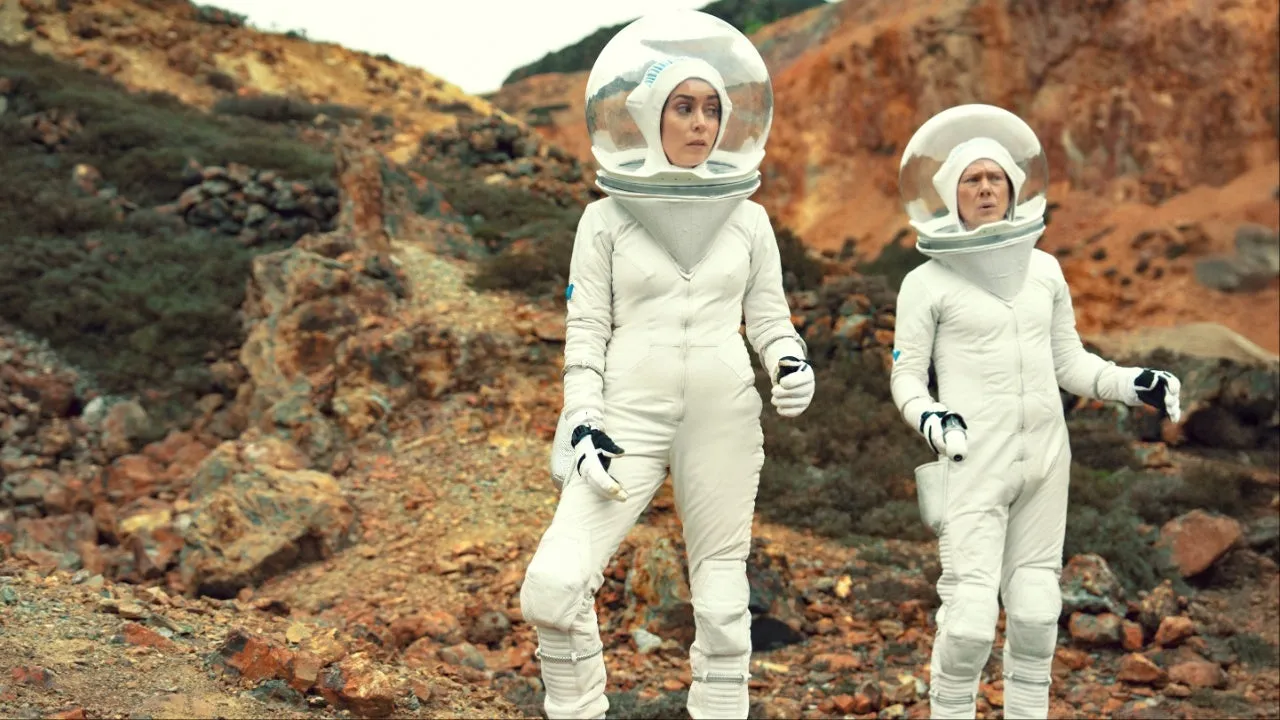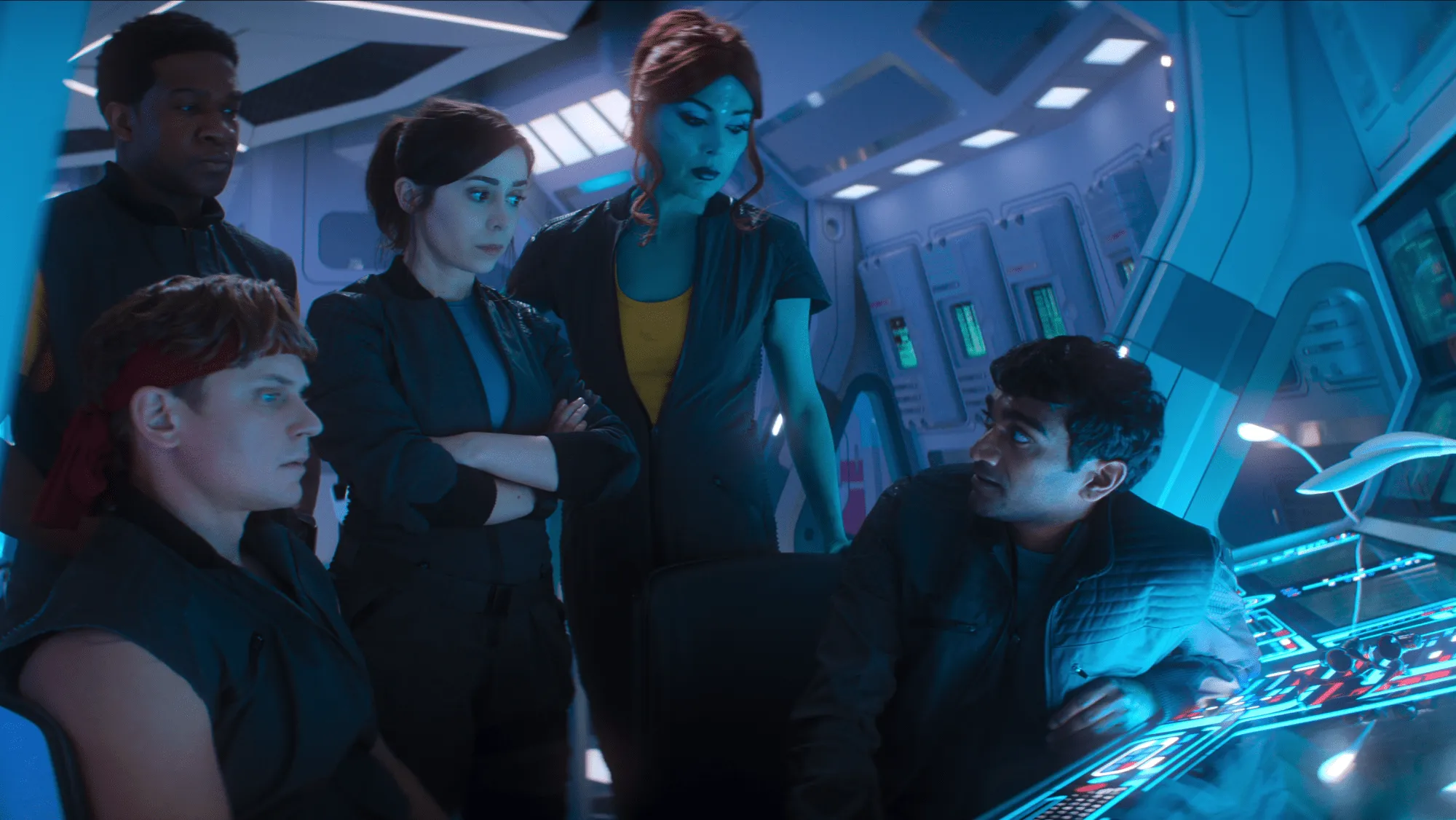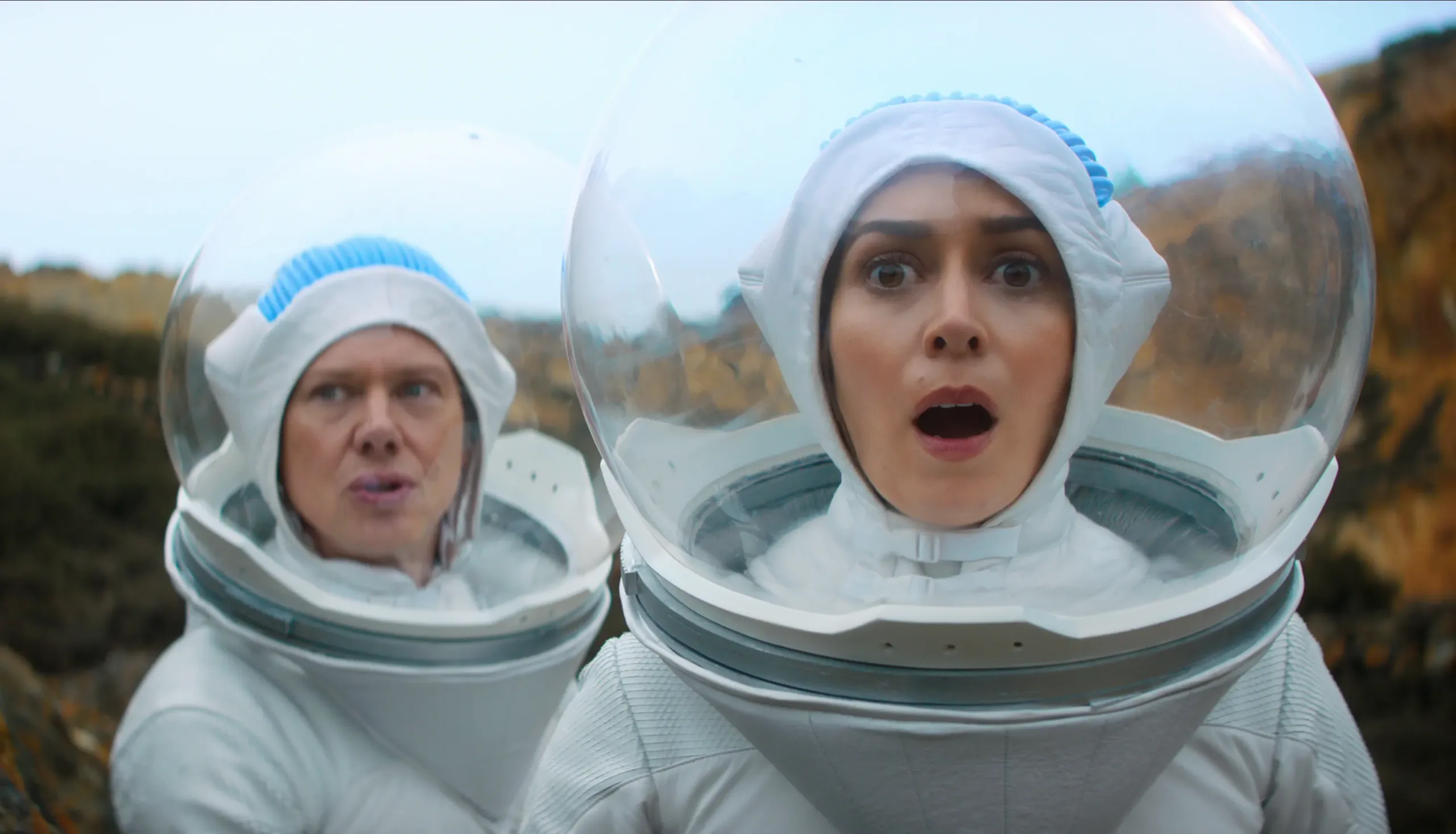Black Mirror Season 7 arrives with a format that revives familiar free-floating narratives while reinventing its approach to modern screen lore. The season presents itself as a collection of thought experiments, each episode arranged with care like separate sketches from an unseen playwright.
A wry sense of humor underpins the stark images, as if the script were smirking at the absurdity of our reliance on glowing screens. There is a persistent reminder of older science fiction—stories once confined to grainy reels now refreshed in a crisp digital glow.
The series examines the delicate interplay between modern devices and the vulnerability of the human spirit. Some segments echo a style reminiscent of vintage cinema, histrionic yet reflective, where cautionary fables are interspersed with tender recollections of human flaws.
At moments, the narrative veers sharply into unexpected twists (a literary fork, if you will) that recall a time when narratives bore a clearer divide between wires and emotions. This season questions how our devices shape our identities in a way that mimics both art and historical irony. There are moments that seem to wink at the audience, revealing that the interplay of technology and sentiment can be as absurd as it is profound.
Intersections of Progress and Paradox
In this chapter of Black Mirror, technology functions as a double-edged sword: it cultivates unexpected connections while erecting unseen barriers. The season portrays modern devices as agents that bring individuals closer even as they isolate them within personalized digital bubbles.
One might compare this to historical moments of communication revolutions—when the printed word shattered isolation, yet also seeded divisions—and now our screens perform a similar role (picture Socrates in a modern tech forum).
The show appears to adopt a reflective tone that combines a smidgen of optimism with a subdued sadness. Episodes that reference familiar devices, such as the experiencer disk, signal an effort to maintain continuity with earlier explorations.
There is a clear nod to past narratives, rendered in a style that attempts to balance affectionate remembrance with the urgency of today’s societal dilemmas. This rethinking of the usual dark humor casts old concerns in a slightly different light; the cynicism of previous installments is replaced with stories that carry a quiet, conflicted hope.
Creative storytelling is executed through multiple narrative devices. The series experiments with non-linear progressions and tactical jumps in chronology. There are instances where short, abrupt shifts catch the viewer off-guard, inserting a note of dry humor in otherwise weighty scenarios.
Suspense is assembled by layering irony and brief moments of laughter amidst perplexing twists (a tactic that might remind one of a well-timed punchline during a heated debate). The anthology format liberates each chapter to try out distinct narrative genres—from psychological frights to adventurous, speculative escapades—each adding its own texture to the season’s overall mosaic.
At the convergence of philosophy and gadgetry, the series raises pressing inquiries about agency. Who exactly holds sway: humankind or the technology it creates? The narrative scrutinizes how data-driven replicas of memory and personality can challenge the very idea of a human identity.
Questions about authenticity in an age of digital reconstruction mirror debates that once emerged during the era of industrial transformation, when machines dramatically reshaped everyday life (imagine a dusty factory floor now replaced by luminous server farms).
Occasionally, the tone slips into dry humor, highlighting the absurdity of our techno-centric era with sharp, unexpected quips. Even as the narrative explores weighty ethical quandaries—about control, responsibility, and lost selves—a lighthearted remark sneaks in, poking fun at an otherwise serious predicament.
Fragmented Realities: Dissecting Episode Architecture
Each installment in this season appears as a self-contained exploration with its own tone, pace, and narrative focus. One episode carries the lineage of prior digital exploits (think of that filmic nod to a familiar ship and its rebellious crew) while another charts uncharted territory in simulated worlds and fragmented memory.
There is an assortment here that evokes several eras of film, from the clatter of early sci-fi to the understated drama of late-century cinema. The episodes offer a colorful array of emotional registers—some brisk in their revelations, others giving ample room for patient observation. One cannot help but compare these micro-stories to short films shown at midnight screenings, each leaving a distinct impression.
Recurring motifs, such as a mysterious disk that captures experiences, weave elements of continuity throughout the season. This emblematic object links the seemingly isolated narratives into a unified fabric (a clever mechanic that hints at an unseen director stitching together loose threads).
There is a subtle conversation between episodes: a sequel to a previous tale coexists with innovative experiments that reconstruct memory in unexpected ways. The effect is akin to a collage of historical snapshots—a visual archive that speaks to our relentless search for meaning in a digital era. At times, the interconnections feel deliberate, at others they evoke accidental serendipity (an odd mix that stokes both interest and skepticism).
The creators experiment with an array of narrative tools that challenge simple categorization. AI, neural interfaces, and time loops serve as both plot devices and symbols of the modern human condition. Each tale juggles notions of memory and personal identity (occasionally tossing in a wry aside that hints at the absurdity of our reliance on technology).
These devices work to turn established dystopic atmospheres into arenas for unexpected twists. The structure is not linear; think of a puzzle reassembled in real time with pieces that sometimes appear mismatched—yet somehow, they provoke a curious sense of coherence.
Pacing fluctuates strikingly between stories. Some segments rush with kinetic energy, while others insist on lingering in quiet tension. Short bursts of fast-paced dialogue can give way to long, reflective pauses (one might compare these intervals to the rapid, staccato editing of classic montage sequences).
Such variations serve to heighten both the emotional and intellectual effect on the audience, provoking reaction as much as they prompt reflection. The selection of tempos appears intentional, mixing sharp, quick moments with lengthy, measured ones, each leaving the viewer both puzzled and engaged.
Human Impressions in a Digital World
A gallery of performances emerges this season, each portrayal a focused study in digital existence mixed with raw emotional hues. Issa Rae demonstrates a spark that unsettles the sterile realm of circuitry (her glance conveys defiant wit, as if playfully signaling that screens need not dull the human touch).
Paul Giamatti brings forth a wearied determination (with an almost vintage austerity reminiscent of old cinematic rebels), his portrayal a study in contradictions that expose both melancholy and stubborn resolve. Emma Corrin exudes a fragile determination, capturing vulnerability in moments when the line between physical being and virtual construct blurs.
The casting operates like a finely tuned ensemble—familiar faces sidling up to emerging talents in performances that challenge the viewer’s preconceptions about identity in a digitized society. Each character unfolds like a self-contained parable, their personal histories entwining with futuristic scenarios that question the legacy of memory and the authenticity of self. A subtle glance, a hushed pause (small gestures that speak louder than scripted dialogue) hint at internal strife hidden behind the veneer of digital interfaces.
The collective energy of the ensemble imparts a quiet commentary on modern existence. One might observe that supporting figures contribute nuances that enrich the fabric of the narratives without overwhelming its core. There is an almost kinetic interplay among the characters—a social mosaic reflecting a society caught in the oscillation between tangible relationships and the seductive lure of technological mimicry.
Beyond individual statements, the group’s collective dynamic silently questions how recognition persists in an era of algorithmic reproduction. Occasional wry interjections (a smirk at the absurdities of techno-societal norms) disrupt the tension, inviting viewers to pause and reflect on what it means to be truly human amidst virtual shadows.
Futuristic Craft: A Study in Sight and Sound
Charlie Brooker’s creative approach this season reveals a penchant for experimental choices that feel like a nod to cinematic rebels of the past (think of the avant-garde spirit of early art films mixed with a wry commentary on our digital era). The creative vision stands as an inquisitive challenge to tradition, using inventive narrative devices that provoke thought and occasional smirks from viewers. Brooker appears to toy with conventional aesthetics by reinterpreting familiar visual language in unexpectedly fresh ways.
Visual storytelling takes center stage through a contrasting play between retro elements and modern imaging. Some episodes indulge in stark monochromatic sequences reminiscent of film noir, while others burst forth in vivid, dynamic compositions that evoke the energy of mid-century modernism.
Color schemes and lighting are deployed with precision to accentuate thematic concerns, lending an almost painterly quality to each frame (a delightful blend that might remind one of the subtle critique found in classic propaganda posters).
Production choices manifest as intricate digital environments and meticulously designed sets that call to mind historical examples of artifice in cinema. The interplay of camera angles and carefully orchestrated digital effects creates environments that occasionally feel hyperreal—a space where reality is a construct (or perhaps a clever illusion). Elements such as reflective surfaces and simulated interfaces become metaphors for a society increasingly defined by its digital footprints.
Soundscapes and musical cues add their own dimension to this visual feast. A measured, occasionally haunting score underpins the narrative, punctuating moments with a precise yet unforced rhythm. Auditory details build tension and sometimes evoke the auditory aesthetics of past cinematic eras, serving as a reminder that technology’s influence is not confined to sight alone. This marriage of sound and vision raises questions about the sensory experience of modernity and its cultural repercussions.
Digital Allegory and Cultural Reverberations
This season presents its symbols as succinct metaphors of our digital existence. The experiencer disk—a recurring emblem that recurs like a cinematic flashcard—serves as a coded message about human connection and isolation.
Its repeated appearance functions as a sort of visual punctuation, questioning the essence of memory and identity in a world saturated by technology. Each narrative strand, particularly the motifs of digital memory uploads, transforms everyday experience into an abstract tableau that challenges established notions of reality (a curious mix of artifice and genuine human struggle).
The narrative folds unfold against a backdrop of modern societal shifts. Echoes of the corporatization of healthcare and the pervasive influence of media are embedded in the storylines; they reflect a society where personal health and information have become commodities.
There is an inherent irony in the way characters navigate a landscape dominated by data and algorithms—a scene that could remind one of the transformative social shifts witnessed during major industrial revolutions. These visual and thematic markers initiate a quiet debate about personal freedom and the encroachment of impersonal systems.
Questions of moral ambiguity and the balance of human will against digital determinism arise repeatedly. Characters confront dilemmas where the effects of technology seem to outrun individual intentions, raising inquiries about accountability in a digitized age.
Scenes portraying data-driven reconstructions of self might evoke memories of historical moments when scientific advances redefined personal agency (an odd parallel to eras marked by radical inventions). Yet, there are instances of stubborn personal defiance, suggesting that even in a realm dominated by calculated processes, moments of genuine spontaneity can emerge.
Some narrative threads hint at a future in which the interplay of human experience and technological intervention will redefine our social fabric. The symbolic vocabulary established this season paves the way for ongoing debates about what it means to be human. Small, sometimes abrupt moments within episodes provoke reflection about the permanence and impermanence of digital imprints.
The season crafts a layered cultural commentary that stimulates a reevaluation of accepted norms. It raises urgent questions regarding progress and the evolution of individual identity—questions that echo long-held debates while also paving new roads for discussion in today’s tech-influenced society. The use of symbolic imagery, recurring motifs, and narrative subtexts creates a rich canvas that invites contemplation on the lasting imprint of digital culture on our collective consciousness.
The Review
Black Mirror Season 7
This season captures digital anxieties and redefines identity through inventive symbolism and layered narratives. It challenges viewers with nuanced storytelling and interwoven themes reflective of our current cultural milieu, all while balancing emotional depth with technical flair. A few narrative missteps exist, but the performances and direction anchor its ambitious vision.
PROS
- Thought-provoking symbolism and layered narratives
- Strong, memorable performances
- Bold, experimental storytelling
- Striking visual and audio design
- Culturally reflective themes
CONS
- Uneven pacing in certain episodes
- Occasional narrative missteps
- Some experimental choices may feel inconsistent
- Complex themes might not appeal to all viewers




















































